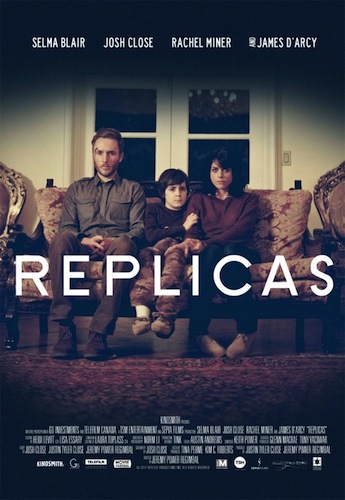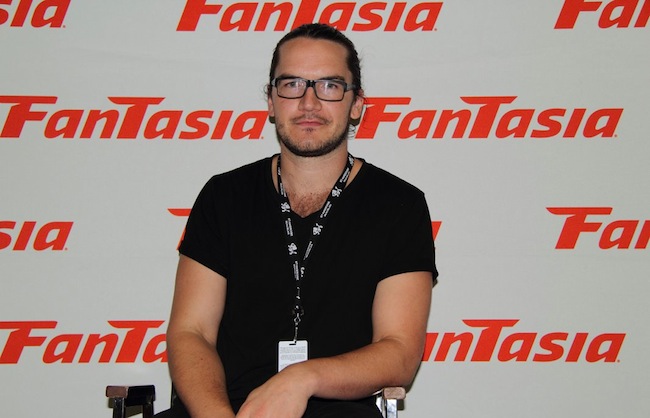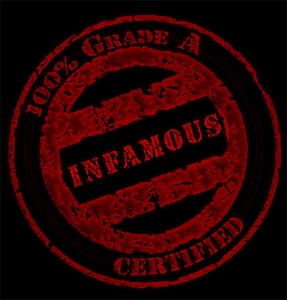
The Kidd here...
One of the films that I dug while up in Montreal for the Fantasia International Film Festival was a home invasion flick out of Canada titled REPLICAS... or, at the time, it went by REPLICAS. Now a title change has gone done, and the movie is referred to as IN THEIR SKIN. I get the feeling REPLICAS may have felt a bit too sci-fi for some, and that's really a shame, because, for the type of movie this is, the original title worked.
REPLICAS is about a pair of families, identical in physical make-up, who couldn't be more different. One is searching for a time when they can get beyond a tragedy that has befallen them, while the other is seeking the perfect life they believe the other to have. There is plenty of copy-catting to go around in a creepy and uncomfortable fashion, and, because of that, REPLICAS sounds much more on-point than IN THEIR SKIN... but that's their decision to make.
That doesn't change the fact that first time director Jeremy Power Regimbal is able to really deliver an intense film for the most part. (You can read my full review HERE.) It's the interaction between the film's six central characters that ups the ante as it goes, creating a scenario that can become psychologically frightening if home invasions get at you the way they get at me.
Following the film's Canadian premiere at Fantasia, I was able to chat for a few minutes with Regimbal about then-REPLICAS, the conventions of making a home invasion movie of sorts and finding the right chemistry for its cast. Enjoy...

The Infamous Billy the Kidd - In a film like this, where you’re obviously dealing with home invasion, and there’s a long line of home invasion films that come before it, how much are you a slave to certain conventions to kind of make sure that you’re following what the audience expects and what they want out of a home invasion type of film, while also maintaining an original vision to kind of make it your own?
Jeremy Power Regimbal - Well, it’s weird, for me, I’m not... I don’t have anything against home invasion, but I’m definitely not like a big fan, or know every one of them, so I feel like lost when people start comparing it tosome of the movies I don’t even know very well. So it was never really... We never went into it being like “let’s make the next level of home invasion,” or let’s be this film or let’s be that film, it was kind of like... We wanted to explore this couple’s relationship and what would happen if we threw them in the most traumatic situation, and we wanted to play around with identity theft and different ways that people could steal someone’s identity and it... You know, it just slowly turned into that, because it kind of gravitated towards that more through the class system where we were like, oh, they can be this rich family in this beautiful house, and then the lower class family... It just naturally morphed into that. Yeah, I never really set out by any means to change the rules or to stick inside them. You know, a lot of the things I get inspired by are more like music and photography, so I’m not a huge film encyclopedia by any means so... I don’t think I was attempting to. [laughs]
The Kidd - There are certain things along the way that... Like, typically, there’s always that first stop at the gas station. And plus, there’s kind of... There’s a similarity with home invasion films that kind of have been with zombie films, too, in that it’s not about the home invasion or... That’s kind of the device, but then you’re working with always these fractured characters, fractured individuals, fractured relationships, that then get expanded upon as the film goes. You learn more about these characters, what happened to these characters. Is that... Especially in building the script, is that something that’s important to make work with these characters, kind of put that puzzle together that you’re revealing along the way?
Jeremy Power Regimbal - Yeah, I think any script to any movie, it’s important to slowly reveal the characters and... This was my first film but I feel like mysteries and to add tension in thriller, it’s so important to reveal little bits, but never give it all away and keep penciling away and to dangle something out and then take it away. I think that’s how tension really happens, is that... Or the audience knows something that the person doesn’t know on screen. Those kinds of things, I think, are what makes the tension.
The Kidd - You spoke a little bit about, in the Q&A, which is the violence or the lack thereof in certain parts of the film. How important was... I know you’ve been trying to avoid it to a point, but is there kind of a level that you know you have to give to the audience in order to make sure they buy the threat level, or the stakes that are in the film? Because if you just have these people just in the house and take hostages and there’s kind of no level of force that they’re putting on, it’s going to be harder for the audience to buy into it.
Jeremy Power Regimbal - Absolutely. I think that’s the whole balance of when to cross that line. You know, because it’s so true. You get to some point and you’re like, "Why can’t they just steal the gun? This guy is talking a big game but he’s not going to follow through." I think there’s a moment in the film which we both saw where you start to realize that, "Oh shit, things are serious, he will go this far." And I definitely think that’s a big turning point and you don’t want to do that too early on, and I think you don’t want to do it too late. That’s definitely balanced. It becomes very unbelievable if the people are just talking because then you’re like, if your life is really on the line and this guy is just talking, then why wouldn’t you attack him?
The Kidd - There’s also this build in the tension that also kind of comes with the awkwardness of the characters, and a lot of that goes toward the casting. How key... You had scripts before you started casting, but how key was it to... How difficult was it, more or less, to find the right fit for these characters where you have people who are... Who can come across as friendly, maybe a little bit overzealous, but also to the point where, as an audience watching it, you know that there’s something not quite right to them?
Jeremy Power Regimbal - Absolutely. You know, we looked at a lot of different people, especially for the Bobby role. That was one of the more interesting ones for actors to play, and obviously if we picked... You know, you pick the wrong person and it’s always the villain, it’s always evil, and that it’s obvious. You know right away that... It’s no hiding what’s happening fairly early on in the film, but absolutely, you have to have the person that you can expect both. Does Mark have a weird dark side to him that we don’t know about? Does Bobby? No... But yeah, absolutely. Like, James [D’Arcy] and Rachel [Miner] both were so amazing to work with. James has a British accent, he stayed in that character all the way through. Our script supervisor didn’t even know that he was British, that’s how... True story, end of the movie, we’re all talking and someone says something about "Oh, the British actor," and she’s like, “Who’s the British actor?” And I was like... That’s fucking impressive, the script supervisor, who just studies his every word over and over didn’t even know he was British. So there’s... They’re great at that, you know, in the meeting, James won us over, he was so... He really wanted to play the person that just comes in and... You know, the guy that’s at the party and everything stops and he just bulldozes through the party, and that’s... He did a great job of that. He seemed so nice and friendly and harmless but you just knew there was something not right.
The Kidd - There’s a lot of attention to detail, as far as copying and mimicking this family that they’re trying to become, right down to... When there is that one big act of violence, and there’s this dual reaction that is identical. So, when it came to that, was it inherent in the script? Was it something that the actors had leeway to play with in terms of how much they were trying to mirror their counterpart?
Jeremy Power Regimbal - It was definitely... You know, the beauty of this project in general is that Josh [Close] wrote the screenplay... The three of us came up with the idea, so it was like... The screenplay, we started shooting it and it was like... It was the skeleton, but we could just play around within that world. Josh is right there if we had an idea, Justin [Tyler Close] is right there, and we all get to throw stuff back and forth, but you know, the mimicking and copying was definitely in the script, but a lot of that came in rehearsals and we just started playing around with it. James would [mimic Josh] ... Like we’d be sitting there during rehearsals and he wouldn’t stop doing it for hours. Josh would lean back and he’d lean back... Because he became awkward. I think, obviously, James did a lot of things on set that he would... Me and him would talk about it, we wouldn’t tell anybody what he’s gonna do, so we got lots of really natural reactions, I feel like, from that. But everyone really brought that kind of level, and we were lucky that everyone got to play around for a week and a half before, and I feel like a lot of it came out then, and then on set... The dinner table scene, especially, he really poured it on there. That was kind of the big shifting, mimicking moment where they start realizing so... But I feel like it’s always... Any good script is not too action heavy, like they’re not... I feel like an actor wouldn’t want to do it if it’s like, “Then you lift your hand...”
The Kidd - Too constricting.
Jeremy Power Regimbal - So I feel like a lot of it... That’s why the writing was really good. It wasn’t really overly action heavy. They knew that that’s what these characters would be doing because that’s all they care about.
The Kidd - In working with the kids, because... Because usually you may have a kid on the victim’s side, but this is one of the rare times where you have the kid kind of on the offensive side. How difficult is it to work with a child actor to make it believable that they could have this villainous streak in their role without it becoming a little too over the top, or less believable?
Jeremy Power Regimbal - Yeah, you know, it’s hard. Child actors in general it’s a different world, but the beauty of... You know, Alex, I’ve actually seen in a lot of movies, and both the kids in this film have bigger resumes than the majority of actors that I know, by far. They’re young superstars. And Alex I had seen in a short film and I’d seen in a lot of other things, and I’d met him at other festivals and stuff, and... Yeah, he... I feel like also, because there wasn’t a lot of dialog, it was very dry, his whole role, it was twice as hard. he brought it to a whole other level. He’s just a pro. We met with so many kids and rehearsed with so many kids and they’re all so... They’re nervous and you have to kinda plug through that, and then he came in and he’s like, he was just that kid. He came in and had that jacket on and brought a knife to the audition and stuff, and we’re like, "Who the fuck..." And I was like, wait a minute, this is that kid, I saw him in our friend’s... You played this... There was a short film called BIGHEAD... It’s nothing like this movie, but it’s just like... He was really good in it and he’s been in tons of big films and that... He just brought it out, you know? But absolutely, it’s hard with anybody, but a child actor... You want to make sure it’s believable, and that’s the hardest part, really. But everybody always say that they hate them at the end of this film. They’re like, “I hate that kid!” It’s funny because he’s like the nicest kid in real life.
The Kidd - I dig home invasion film because I think there’s a psychological level that you don’t get with other horror films. Not to that this kind of plays like a horror film, but it’s very much something that you fear could actually happen as opposed to slashers or monsters running around, and I think in terms of this it works very well with trying to base it in reality and have these people that may have just snapped or there’s something clearly wrong with him that you see that on a daily basis where it could be anybody, like this could take place anywhere, to anybody... And just in kind of working that... trying to make this an average family that you can kind of buy into, was there a kind of discussion... I know you dealt with the class thing, but to what level did you not want him to be too unattainable to where they’re not relatable? Because he asks him the question of "Which do you prefer: your car or your boat," which, at that point, some people could see it and say...
Jeremy Power Regimbal - Yeah, I feel like if they hadn’t had this horrible... If they hadn’t lost their daughter and they weren’t greiving, because anybody can relate to grieving. Maybe not to that extreme, but I feel like that is what made them relatable, even if you don’t have a lot of money and you’re whoever you are, anybody can relate to that. I feel like if they were just this rich, cocky family going away, it definitely would have been... You probably would have almost wanted them to die, you know? That sounds bad, but I feel like that was a big thing. Obviously, I think it’s any situation, like Hitchcock films are... He’s like the king of that, the normal guy in the unusual circumstance, and that’s why it’s so good. I think it’s definitely a big worry with any character. You don’t want them to be too off in their own world or else nobody cares.
The Kidd - Alright, thank you very much. I appreciate it.
Jeremy Power Regimbal - Thank you, man.
IN THEIR SKIN (formerly REPLICAS), starring Selma Blair, Josh Close, James D'Arcy and Rachel Miner is set for a Fall 2012 release via IFC Midnight.
-Billy Donnelly
"The Infamous Billy The Kidd"
Follow me on Twitter.

